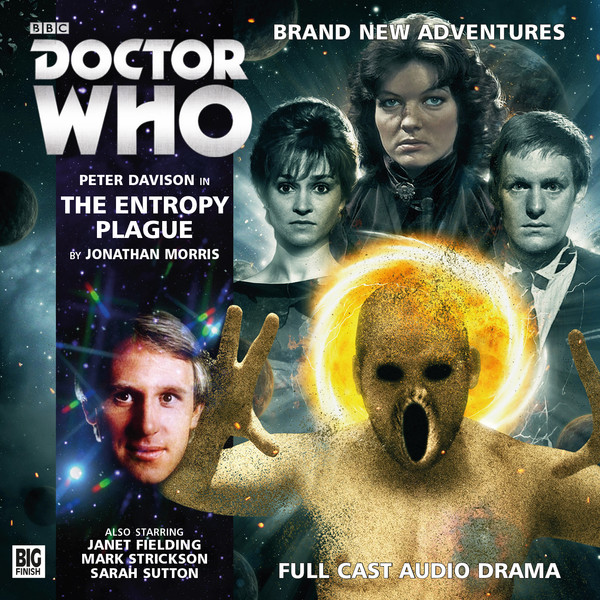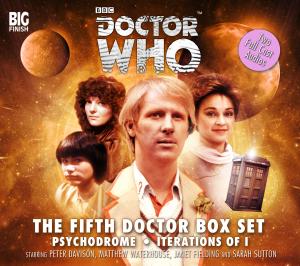The Waters of Amsterdam
Written by Jonathan Morris
Directed by Jamie Anderson
Starring Peter Davison, Janet Fielding, and Sarah Sutton
with Tim Delap, Richard James, and Elizabeth Morton
Out now from Big Finish Productions
1983……. and Doctor Who returns to our screens with an exciting adventure by Johnny Byrne - featuring Time Lords, and the return of Tegan, set and filmed in Amsterdam….
Well, two out of three isn’t bad. Arc of Infinity isn’t really very exciting. It has got Time Lords in it, and Tegan returns, having been left behind at the end of Time-Flight. And it’s in Amsterdam, because JNT got a good deal at the Travel Agent.
2016……. and Doctor Who returns to our speakers with an exciting adventure by Jonny Morris, with just the one Time Lord, dealing with Tegan’s return, set in Amsterdam…
The Waters of Amsterdam does what Arc of Infinity manifestly failed to do – use its location and make good use of Tegan. Into the bargain, it’s also very good. Arc could have sketched in Tegan’s time away from the TARDIS, but didn’t, beyond binning the stewardess uniform and giving her a haircut. It could have also really have been set anywhere near water, as the location had zero relevance to the plot. It might as well have been set in Barnsley.
The story picks up directly from the end of Arc, and wastes no time putting all of this right. After a pointed shredding of Arc’s events, Tegan walks straight into her ex, Kyle (Tim Delap) – and it’s awkward. Their story is related by Tegan to Nyssa in flashback. It’s an unlikely romance, as Tegan is, frankly, Tegan, and Kyle’s just so nice. A bit too good to be true, there’s also something iffy about the way he keeps showing up.
Delap’s performance is excellent, Kyle is calm and endlessly reasonable without being drippy. It’s quickly established that he’s in love with Tegan, but she’s just not that into him.. We eavesdrop on their relationship from beginning to end, via chance meetings, dinners out, and Talking Heads tickets, and find out how Tegan lost her job in the process. Janet Fielding is great here, she has the sort of character development that Tegan was crying out for in the 80s beyond trauma and Mara-possession. Her attitude and caustic humour are present and correct as always, but giving Tegan a relationship that fails because she doesn’t want to be fawned over is her all over, and really works.
In the meantime, the Doctor explores the Rijkesmuseum and has fun playing the art critic when viewing Rembrandt’s work, kicking off a lovely running joke about how to pronounce ‘chiaroscuro’. He also notices that some of the old master’s pieces are of spacecraft. At the end of an episode of exploring and chewing the fat, they are suddenly all attacked by the Nyx, grotesque water creatures that spring from Amsterdam’s canals.
They escape with Kyle in tow to the same spot in the 17th century, where Amsterdam is in its pomp as a trading Capitol and the East India Company rule the roost. The Nyx are also here, and viciously attack anyone in their way. Tegan and Nyssa are quickly taken into the custody of the Mayor, and brought before the mysterious alien Countess Teldak (Elizabeth Morton) - whilst the Doctor and Kyle go to meet Rembrandt (a stand-out performance by Richard James), who is acting as a draughtsman for the ship she plans to escape from Earth in. The old master is proud, but also bitter and cynical about his debts and his lot in life – charging for portraits by the face, and painting Businessmen’s “Wives and Fancy Women”, before they plead bankruptcy. For him, the promise of posthumous recognition isn’t enough. Happily by the end of the story, he’s letting the light back through the shutters.
The Countess is charming, softly-spoken, and outwardly peaceful, a refugee from a dead world, and a fugitive from the Nyx. She’s a complex character, and it’s no great surprise that she turns out to be utterly amoral and ruthless, as the story goes from twist to twist, and Kyle’s true nature is revealed into the bargain. The Nyx are no angels either, but they have a code, and only kill when they see necessary. The Countess uses the Doctor’s compassion against him, and he’s tricked into taking her to an alternative 1983 where she’s manipulated events purely so she can go home and take her revenge.
Jonathan Morris’s script is excellent - funny, moving, and clever in equal measure. It’s ironic that a recording studio could capture so much more of the atmosphere and ambience of Amsterdam than actually going there ever did, and Jamie Anderson’s direction and some clever sound design sells three distinct versions of the same place expertly. The only slight criticism is the voices of the Nyx – inventive, but sometimes quite hard to make out.
The Waters of Amsterdam is a superb example of how Big Finish can go back in time and make things right.











